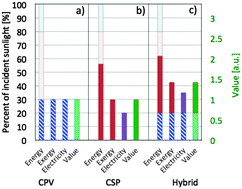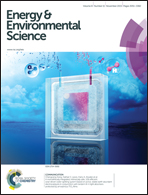Hybrid solar converters for maximum exergy and inexpensive dispatchable electricity†
Abstract
Photovoltaic (PV) solar energy systems are being deployed at an accelerating rate to supply low-carbon electricity worldwide. However, PV is unlikely to economically supply much more than 10% of the world's electricity unless there is a dramatic reduction in the cost of electricity storage. There is an important scientific and technological opportunity to address the storage challenge by developing inexpensive hybrid solar converters that collect solar heat at temperatures between about 200 and 600 °C and also incorporate PV. Since heat can be stored and converted to electricity at relatively low cost, collection of high exergy content (high temperature) solar heat can provide energy that is dispatchable on demand to meet loads that are not well matched to solar insolation. However, PV cells can collect and convert much of the solar spectrum to electricity more efficiently and inexpensively than solar thermal systems. Advances in spectrum-splitting optics, high-temperature PV cells, thermal management and system design are needed for transformational hybrid converters. We propose that maximizing the exergy output from the solar converters while minimizing the cost of exergy can help propel solar energy toward a higher contribution to carbon-free electricity in the long term than the prevailing paradigm of maximizing the energy output while minimizing the cost of energy.



 Please wait while we load your content...
Please wait while we load your content...